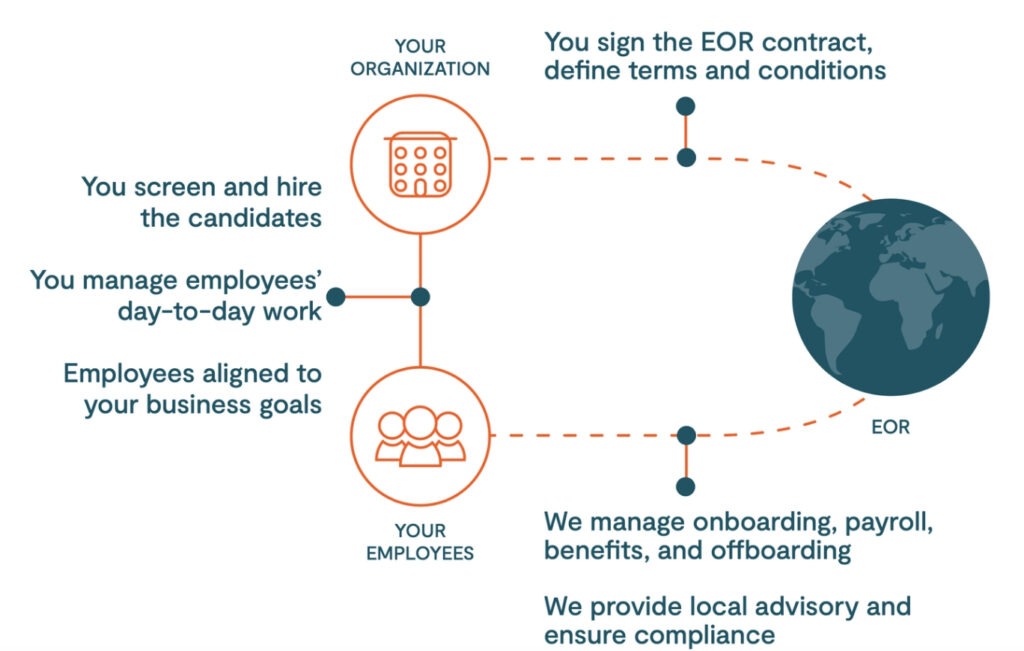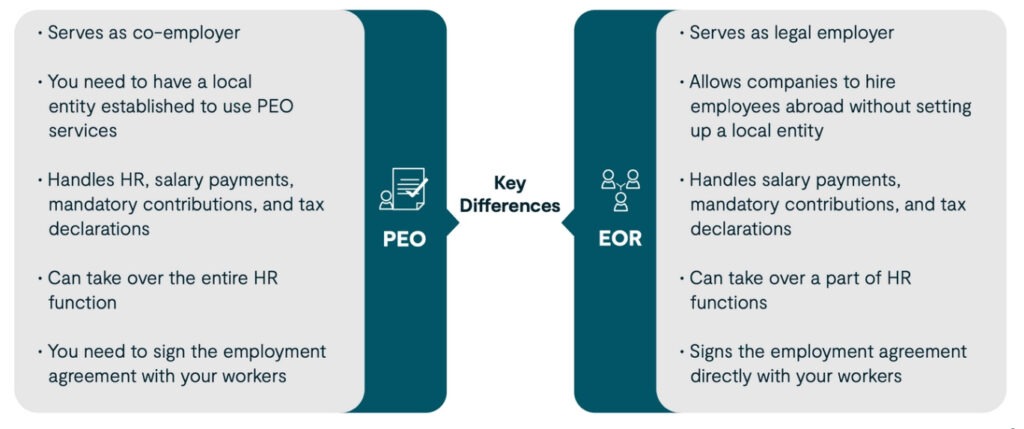Employer of Record vs. PEO: Choose Wisely
Published on
Employer of Record vs. PEO: Make the Right Choice for Your Business
When it comes to managing your company’s workforce, two popular options often come into play for employment support: Employer of Record (EOR) and Professional Employer Organization (PEO) services. Understanding the key differences between these two solutions is crucial in making an informed decision that aligns with your business needs. In this blog post, we will explore the distinctions between Employer of Record and PEO services, helping you determine the right choice for your organization.
What is an Employer of Record (EOR)?
- Definition of Employer of Record
An Employer of Record (EOR) is a service provider that assumes the legal responsibility for employing and managing a company’s workforce. The EOR provider handles tasks such as payroll, benefits administration, global employment outsourcing, and compliance with employment laws, allowing businesses to outsource these responsibilities while maintaining operational control and flexibility.
- Key features and responsibilities of an EOR partner
An Employer of Record (EOR) partner takes on critical responsibilities in managing a company’s workforce. This includes payroll processing, tax withholding, benefits administration, compliance with employment laws, and handling HR-related tasks. The EOR partner acts as the legal employer, assuming liability for employment-related matters while providing operational support and expertise to the client organization.
- Benefits of partnering with an EOR
Partnering with an Employer of Record (EOR) services offers numerous benefits for businesses. It provides access to global expansion opportunities, allowing companies to enter new markets quickly and efficiently. EOR services also handle complex HR and compliance tasks, ensuring legal compliance, minimizing risk, and allowing business organizations to focus on core operations while benefiting from local expertise and streamlined processes.
- How an EOR handles payroll, compliance, and HR administration
Employer of Record (EOR) solutions plays a pivotal role in handling payroll, compliance, and HR administration for businesses. Firstly, they manage payroll processes, including salary calculation, tax withholding, and timely payment distribution to employees. Secondly, EORs ensure compliance with local employment laws, regulations, and reporting requirements, minimizing legal risks and penalties. They handle employee contracts, onboarding, and offboarding processes, ensuring adherence to statutory obligations. Lastly, EOR solution provides comprehensive HR administration support, including benefits administration, leave management, employee record maintenance, and performance management. By efficiently managing these critical areas, EORs relieve businesses of administrative burdens, promote operational efficiency, and ensure smooth HR processes within the organization.

What is a Professional Employer Organization (PEO)?
- Definition of a PEO
A Professional Employer Organization (PEO) is a service provider that offers comprehensive HR solutions to businesses. The PEO partner assumes professional employer responsibilities such as payroll processing, benefits administration, and HR management, effectively becoming the employer of record for employees in an office. This allows businesses to outsource HR functions while maintaining operational control over their workforce.
- Key features and services provided by a PEO
A Professional Employer Organization (PEO) provides a range of key employment features and services to businesses. These include payroll administration, tax management, employee benefits administration, HR compliance support, risk management, and assistance with employment-related legal issues. PEO services also offer access to economies of scale, enhanced employee benefits packages, and expertise in HR practices and regulations.
- Benefits of partnering with a PEO
Partnering with a Professional Employer Organization (PEO) provides businesses with access to HR expertise, cost savings through economies of scale, compliance support, competitive employee benefits, and risk mitigation. By leveraging the PEO’s knowledge and resources, businesses can offload administrative tasks, ensure compliance with employment laws, and offer attractive benefits packages to employees. This allows business organizations to focus on their core operations, enhance productivity, and drive business growth. Additionally, PEO services handle complex HR functions such as payroll administration, benefits management, and compliance, relieving businesses of the associated burdens. Overall, partnering with a PEO enables businesses to optimize their HR operations while achieving strategic objectives.
- Understanding the Differences
The key difference between an Employer of Record (EOR) and a Professional Employer Organization (PEO) lies in the legal employer relationship. In an EOR arrangement, the EOR partner becomes the legal employer of the workforce, assuming full responsibility for employment-related matters. The client organization maintains operational control and direction over its employees. On the other hand, in a PEO model, the PEO partner becomes a co-employer, sharing the employer responsibilities with the client organization. This means that both entities have legal obligations towards the employees, and the PEO provider handles various HR functions while the client organization retains operational control. The choice between EOR and PEO services depends on the level of employer control desired by the client organization and the specific requirements of their workforce management strategy.

Making the Right Choice: EOR Vs PEO Services
Making the right choice between an Employer of Record (EOR) and a Professional Employer Organization (PEO) requires careful consideration of several factors:
- Business Needs: Assess your organization’s specific needs, such as workforce size, geographical expansion plans, and the level of control you desire over HR functions at the office.
- Compliance and Legal Considerations: Evaluate the legal and compliance requirements in the countries or regions where you operate or plan to expand. Ensure that the chosen solution can effectively address these international requirements.
- Cost and Budget: Consider the financial implications of each option. Evaluate the pricing structures, fees, and potential cost savings associated with EOR and PEO services.
- Scalability and Flexibility: Determine the scalability of the solution and its ability to accommodate your business organization’s future growth plans. Consider whether the solution offers flexibility in terms of adjusting the workforce size and geographic locations.
- HR Support and Expertise: Assess the level of HR support and expertise offered by each option. Consider the range of services provided, such as payroll administration, benefits management, compliance support, and employee relations.
- Risk Management: Evaluate how each option handles risk management, including employee-related issues, legal disputes, and compliance challenges. Consider the level of risk mitigation and liability transfer provided by each solution.
- Industry and Peer Insights: Seek insights from industry experts, consult with peers who have experience with EOR or PEO services, and explore case studies or success stories relevant to your industry.
By carefully considering these factors and possibly consulting with HR professionals or legal experts, you can make an informed decision that aligns with your organization’s goals, compliance requirements, employment opportunities, and overall workforce management strategy. Ultimately, evaluating the pros and cons of EOR vs. PEO services will enable you to select the most suitable solution to optimize
your workforce management strategy.
Conclusion
Choosing between an Employer of Record (EOR) and a Professional Employer Organization (PEO) is a critical decision that can impact your business’s growth, compliance, and overall success. By understanding the distinctions and assessing your organization’s unique requirements, you can make an informed choice that aligns with your goals. Whether you prioritize control and flexibility or seek comprehensive HR support, selecting the right solution will pave the way for effective workforce management.
Remember, when deciding on the right choice between an Employer of Record and a PEO partner, it’s essential to consult with HR professionals or legal experts to ensure compliance with local regulations and make an informed decision tailored to your specific business needs.




